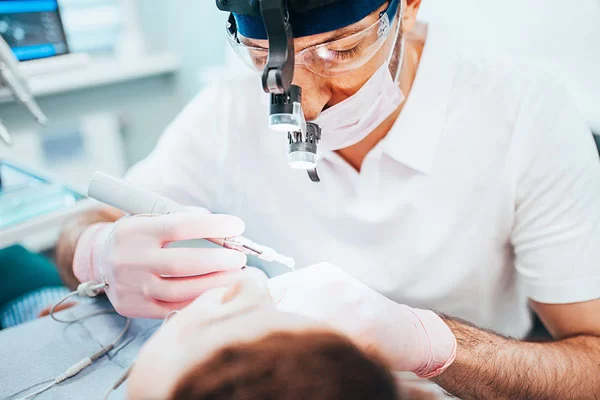Please note we may not offer this service at our office. Contact (614) 771-6060 to learn more.
A Minimally Invasive Approach to Removing Infected Dental Tissue
Root canal therapy is among the most common dental procedures for addressing tooth decay, though it typically involves surgery, which can be daunting for some patients. Fortunately, non-surgical root canal treatment presents a painless and effective alternative to traditional root canal therapy.
For more insights into this nonsurgical option, continue reading our guide from the Hilliard, OH, dentist to gain a comprehensive understanding of how this treatment operates. If you have any inquiries or concerns, feel free to contact our Hilliard, OH, dental office by calling (614) 771-6060.
What Is Non-Surgical Root Canal Treatment?
Non-surgical root canal treatment is a minimally invasive dental procedure designed to address tooth decay and preserve the natural tooth, avoiding the need for extraction. Unlike traditional root canal therapy, which typically involves surgical intervention, non-surgical root canal treatment is performed without any incisions or cuts.
Instead, your dentist utilizes specialized tools to remove the infected or damaged pulp from the tooth, clean the root canals, and fill them with a special material.
Benefits of Non-Surgical Root Canal Treatment
Non-surgical root canals provide several advantages over surgical root canal therapy, including:
- Pain-Free Experience: Non-surgical root canal therapy isn’t painful and generally requires only a local anesthetic. Patients typically don’t experience pain during the procedure and have minimal discomfort afterward.
- Swift Recovery: As a minimally invasive procedure, patients can usually return to their regular activities immediately following treatment.
- High Efficacy: Non-surgical root canal treatment is equally effective as surgical root canal therapy in addressing tooth decay. It boasts a high success rate and can prevent the need for tooth extraction.
Candidacy for Non-Surgical Root Canal Treatment
Patients are typically considered for non-surgical root canal treatment when tooth decay hasn’t progressed too far.
Several indicators may suggest you are a suitable candidate for this non-invasive procedure:
- Intense Toothache: Experiencing a severe toothache, especially when chewing or applying pressure, might indicate inflammation or infection of the tooth’s pulp.
- Temperature Sensitivity: Persistent sensitivity to hot or cold temperatures, even after the source is removed, can suggest potential damage to the pulp.
- Tooth Discoloration: A tooth that appears discolored or darkened may signal a dying pulp.
- Swollen or Tender Gums: Swelling or tenderness in the gums surrounding a tooth could suggest an infection that might necessitate root canal treatment.
- Recurring Gum Pimple: A persistent or recurring pimple on the gums, known as a dental abscess, could indicate an infection spreading from the tooth pulp to the surrounding gum tissues.
The Non-Surgical Root Canal Treatment Procedure
The non-surgical root canal procedure typically takes about one hour in a dental office. Here’s what to expect during the procedure:
- Numbing the Area: The dentist will numb the area around the affected tooth using a local anesthetic.
- Accessing the Pulp: They’ll use a special tool (usually a dental drill) to make a small hole in the top of the tooth to access the infected pulp.
- Removing the Infected Pulp: Your dentist will use small, flexible files to remove the infected pulp from the tooth and root canals.
- Cleaning the Root Canals: Once the infected pulp is removed, the dentist will clean the root canals using special tools. The root canals will be irrigated with a disinfectant solution to eliminate any remaining bacteria.
- Filling the Root Canals: Then, your dentist will fill the root canals with a special material, gutta-percha, to prevent further infection.
- Sealing the Tooth: Finally, the dentist will seal the tooth with a filling or crown to prevent bacteria from entering the tooth.
Non-Surgical Root Canal Treatment Aftercare
Following the procedure, most patients can return to their daily routines right away. However, it is essential to adhere to the dentist’s guidelines for caring for the treated tooth, which may involve:
- Steering clear of hard or crunchy foods for a few days post-treatment
- Taking any prescribed pain medications as directed by the dentist
- Maintaining good oral hygiene by brushing and flossing regularly
- Schedule a follow-up appointment with your dentist
Frequently Asked Questions
Is non-surgical root canal treatment painful?
Not at all. Non-surgical root canal treatment is generally not painful as it involves only a local anesthetic. Patients might experience slight discomfort or pressure during the procedure.
How long does non-surgical root canal treatment take?
Typically, non-surgical root canal treatment is completed in about an hour. However, the exact duration may vary depending on the complexity of the case and the number of canals that require treatment.
Does insurance cover non-surgical root canal treatment?
Yes, most dental insurance plans typically cover non-surgical root canal treatment. However, it’s advisable to verify your coverage with your insurance provider, as the specifics of your plan and the complexity of your case can affect coverage.
Treat Infected Root Canals Without Surgery
Non-surgical root canal treatment is a viable alternative to traditional root canal treatment. It offers several benefits, including a quicker recovery time, less downtime, and a higher success rate.
Schedule a consultation with Dr. Nathan Desai by calling (614) 771-6060 to see if non-surgical root canal treatment is right for you. With proper aftercare, you can enjoy a healthy, pain-free smile for years to come. We proudly serve patients from Columbus, Dublin, Upper Arlington, Grove City, Westerville, and surrounding areas.







